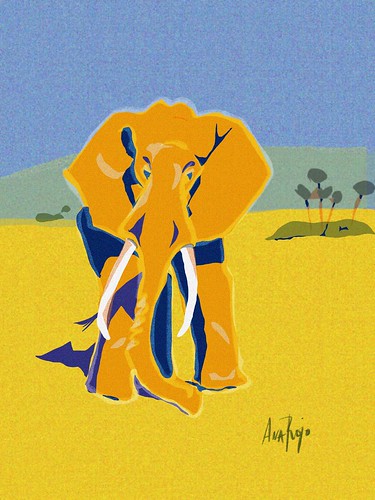Los Ciegos y el Elefante es una conocida fábula hindú que cuenta la historia de seis viajeros sabios que descubren diferentes partes de un elefante en la trayectoria de sus vidas. Alternativamente, cada ciego crea su propia versión de la realidad a partir de esa experiencia y perspectiva limitada.
Esta es la versión de John Godfrey Saxe (1816-1887) de Los Ciegos y el Elefante:
Seis eran los hombres de Indostán,
tan dispuestos a aprender,
que al Elefante fueron a ver
(Aunque todos eran ciegos),
Pensando que mediante la observación
su mente podrían satisfacer.
El primero se acercó al elefante,
Y cayéndose
sobre su ancho y robusto costado,
en seguida comenzó a gritar:
"¡Santo Dios! ¡El elefante
es muy parecido a una pared!"
El segundo, palpando el colmillo,
exclamó: -"¡Caramba! ¿Qué es esto
tan redondo, liso y afilado?
Para mí está muy claro,
¡esta maravilla de elefante
es muy parecido a una lanza!"
El tercero se acercó al animal,
y tomando entre sus manos
la retorcida trompa,
valientemente exclamó:
"Ya veo," dijo él, "¡el elefante
es muy parecido a una serpiente!"
El cuarto extendió ansiosamente la mano
y lo palpó alrededor de la rodilla:
"Evidentemente, a lo que más se parece esta bestia
está muy claro," dijo él,
"'Es lo suficientemente claro que el elefante
¡es muy parecido a un árbol!"
El quinto, quien por casualidad tocó la oreja,
Dijo: "Incluso el hombre más ciego
es capaz de decir a lo que más se parece esto;
Niegue la realidad el que pueda,
Esta maravilla de elefante
¡es muy parecido a un abanico!"
El sexto tan pronto comenzó
a tantear al animal,
agarró la oscilante cola
que frente a él se encontraba,
"Ya veo," dijo él, "¡el elefante
es muy parecido a una cuerda!"
Y así estos hombres de Indostán
discutieron largo y tendido,
cada uno aferrados a su propia opinión
por demás firme e inflexible,
aunque cada uno en parte tenía razón,
¡y al mismo tiempo todos estaban equivocados!
MORALEJA:
Así también, a menudo en las guerras teológicas
los contendientes, pienso yo,
discuten en la total ignorancia
de lo que el otro quiere decir;
y parlotean acerca de un elefante ¡que ninguno de ellos ha visto!
Esta es la versión de John Godfrey Saxe (1816-1887) de Los Ciegos y el Elefante:
Seis eran los hombres de Indostán,
tan dispuestos a aprender,
que al Elefante fueron a ver
(Aunque todos eran ciegos),
Pensando que mediante la observación
su mente podrían satisfacer.
El primero se acercó al elefante,
Y cayéndose
sobre su ancho y robusto costado,
en seguida comenzó a gritar:
"¡Santo Dios! ¡El elefante
es muy parecido a una pared!"
El segundo, palpando el colmillo,
exclamó: -"¡Caramba! ¿Qué es esto
tan redondo, liso y afilado?
Para mí está muy claro,
¡esta maravilla de elefante
es muy parecido a una lanza!"
El tercero se acercó al animal,
y tomando entre sus manos
la retorcida trompa,
valientemente exclamó:
"Ya veo," dijo él, "¡el elefante
es muy parecido a una serpiente!"
El cuarto extendió ansiosamente la mano
y lo palpó alrededor de la rodilla:
"Evidentemente, a lo que más se parece esta bestia
está muy claro," dijo él,
"'Es lo suficientemente claro que el elefante
¡es muy parecido a un árbol!"
El quinto, quien por casualidad tocó la oreja,
Dijo: "Incluso el hombre más ciego
es capaz de decir a lo que más se parece esto;
Niegue la realidad el que pueda,
Esta maravilla de elefante
¡es muy parecido a un abanico!"
El sexto tan pronto comenzó
a tantear al animal,
agarró la oscilante cola
que frente a él se encontraba,
"Ya veo," dijo él, "¡el elefante
es muy parecido a una cuerda!"
Y así estos hombres de Indostán
discutieron largo y tendido,
cada uno aferrados a su propia opinión
por demás firme e inflexible,
aunque cada uno en parte tenía razón,
¡y al mismo tiempo todos estaban equivocados!
MORALEJA:
Así también, a menudo en las guerras teológicas
los contendientes, pienso yo,
discuten en la total ignorancia
de lo que el otro quiere decir;
y parlotean acerca de un elefante ¡que ninguno de ellos ha visto!
The Blind Men and the Elephant
It was six men of Indostan
To learning much inclined,
Who went to see the Elephant
(Though all of them were blind),
That each by observation
Might satisfy his mind
The First approached the Elephant,
And happening to fall
Against his broad and sturdy side,
At once began to bawl:
God bless me! but the Elephant
Is very like a wall!
The Second, feeling of the tusk,
Cried, Ho! what have we here
So very round and smooth and sharp?
To me tis mighty clear
This wonder of an Elephant
Is very like a spear!
The Third approached the animal,
And happening to take
The squirming trunk within his hands,
Thus boldly up and spake:
I see, quoth he, the Elephant
Is very like a snake!
The Fourth reached out an eager hand,
And felt about the knee.
What most this wondrous beast is like
Is mighty plain, quoth he;
'Tis clear enough the Elephant
Is very like a tree!
|
The Fifth, who chanced to touch the ear,
Said: Even the blindest man
Can tell what this resembles most;
Deny the fact who can
This marvel of an Elephant
Is very like a fan!?
The Sixth no sooner had begun
About the beast to grope,
Than, seizing on the swinging tail
That fell within his scope,
I see, quoth he, the Elephant
Is very like a rope!
And so these men of Indostan
Disputed loud and long,
Each in his own opinion
Exceeding stiff and strong,
Though each was partly in the right,
And all were in the wrong!
Moral:
So oft in theologic wars,
The disputants, I ween,
Rail on in utter ignorance
Of what each other mean,
And prate about an Elephant
Not one of them has seen! --
John Godfrey Saxe
|
|---|


Comentarios
Publicar un comentario